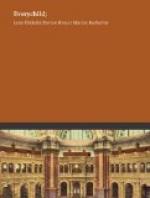“They are simply trees,” said Mr. Literal harshly.
“Yes,” agreed the giant, nodding and smiling, “they are simply trees.”
But Mr. Literal hitched his chair forward angrily. “We are talking nonsense,” he declared. “It is your plan to divert me from my purpose. But you shall not do so. Listen: I forbid you to associate with those innocent children. You would corrupt them. It shall be my duty to expose you if you do not cease from following after them. Do you hear?”
The giant bowed his head thoughtfully. “You ask too much,” he said. “I know I have done evil in my time. But I am repentant. Come, believe me when I say that I would be only a friendly companion to those children. I would add to their innocent joys and take from their sorrows. You do not know me, really. I have no wish to offend you; but I tell you you ask too much when you bid me turn aside from that pleasant company.”
He arose and turned toward the door.
“You are warned,” said Mr. Literal. “Persist in your present course and I shall bring you to your knees.”
“Abandon Everychild?” said the giant musingly. And he shook his head. “No,” he said. Then, wishing to conciliate the old man, he looked about him to where the busts reposed. “They are all friends of mine,” he said with a pleasant smile.
“They are all dead,” said Mr. Literal coldly.
“What!—Shakespeare dead?” cried the giant in amazement. But he did not remain for other words. Mr. Literal was staring stupidly at nothing. He went out into the hall and closed the door behind him. He would have descended the stairs then, but some one brushed against him lightly and whispered, “Why do you waste your time in there?”
“I went in against my will,” said the giant.
The stranger said in glad tones, “I know you well.”
The giant replied, “My name is Will o’Dreams.”
“Yes, yes,” said the other. “My name is Will, too. Though certain well-meaning persons have always preferred to refer to me as William. I used to write plays, you know.”
The giant gazed at him in the dim light. “Of course,” he said.
“I used to live beside the Avon,” said the other.
The giant’s heart grew soft. “It is a beautiful stream,” he said. “And children play along its banks, just as in the old days, and men and women passing that way are the happier because you once dwelt there.”
But the other held up a cautioning finger. His eyes twinkled mischievously in the dim light. “Not so loud,” he said. “Old Mr. Literal will hear you—and you know he doesn’t know I am here!”
They parted then; and the giant went back to his place where the children lay asleep.
PART II
ARGUMENT: EVERYCHILD PITIES THE SORROWS OF CINDERELLA AND REJOICES IN HER RELEASE FROM BONDAGE; HE ENCOUNTERS A DOG THAT LOOKS UPON HIM WITH FAVOR.




